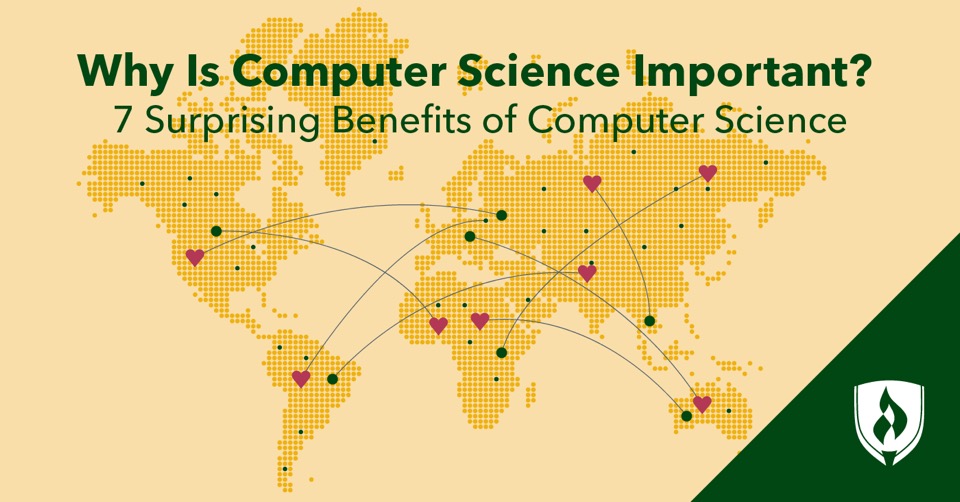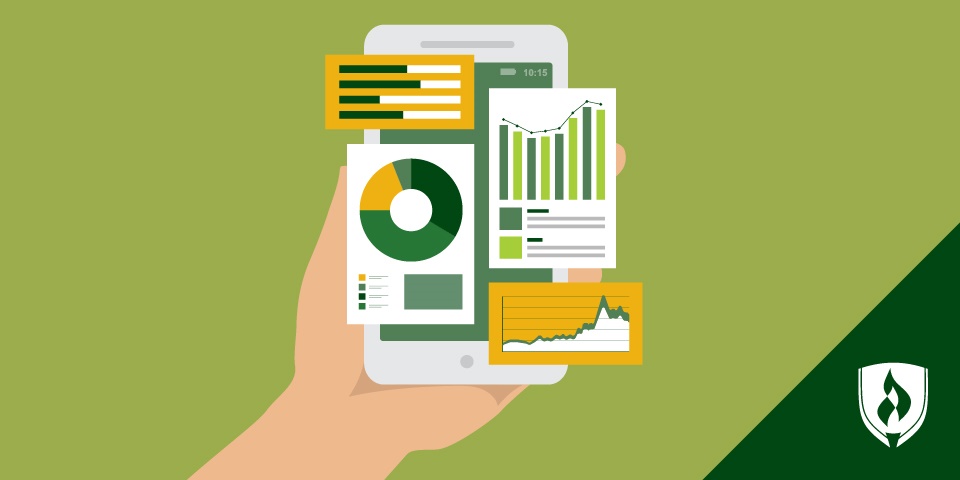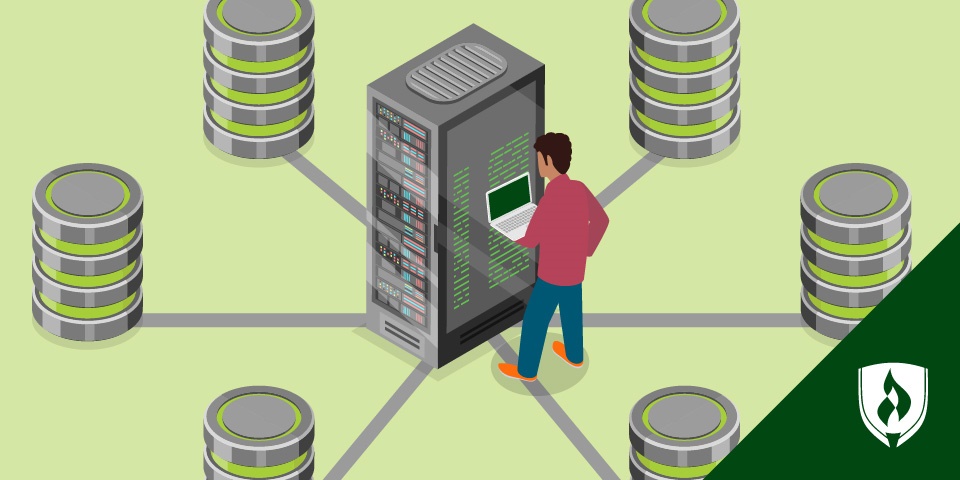Why Is Computer Science Important? 7 Surprising Ways Computer Science Benefits Society
By Brianna Flavin on 05/16/2023

"Why is computer science important?"
It might seem like a simple question, but there’s a lot that goes into answering it. You might start by focusing on the benefits it could bring you personally. You might talk about how computer science-related jobs are appealing in their versatility, earning potential and demand. You might hear about all of the things we use on a daily basis today that were only created because of computer science.
But what you don’t often hear about as often is the altruistic side of computer science and the work professionals in this field do to make the world a better place.
If you’re looking to leverage your love of technology to make a difference, then rest assured. Computer science is an incredible career choice for someone who wants to change the world.
“Societies will die if they don't continue to innovate,” says Werner Krebs, CEO of Acculation. Krebs says technologies are neither good nor evil on their own, and in the right hands, can become powerful benefits to society. “We need bright and ethical people to understand our best and most powerful technologies to ensure they are used for good.”
If you want some concrete examples of just how much computer science benefits society, you came to the right place. We enlisted tech professionals to share with us how their daily work helps people and plays a vital role in their communities. To dive deeper into the role of technology in society, explore "What Does a Network Technician Do?".
Computer science benefits society by…
1. Directly meeting needs
“Since my first day in computer science, I've been trying to have a positive impact on society,” says Thibault Rihet, software engineer at Trialog. Rihet explains that computer scientists can easily get into direct applications that address societal issues like poverty, unemployment, climate change and more.
Rihet explains that France is utilizing startups by assigning teams to create solutions when a public agent identifies a problem. Then the solutions go live nationally. This approach allows computer scientists and other technology professionals to jump in and meet needs as they arise in their communities.
Sites like DataKind® and Code Alliance® can be excellent resources for computer scientists who want to put their skills to work for global issues, according to Rihet. Sites like these allow a wide array of tech professionals to find opportunities to create, support and execute projects that change lives.
There are also indirect benefits from the tools computer scientists build, Rihet points out. Consider charities that are now able to streamline their donations or crowdfunded campaigns that can gather a following and financial backing.
2. Providing opportunities
In an increasingly interconnected world, the internet provides easy access to a multitude of resources. The result is that regardless of race, sex or background, technology and computer science are offering an increasing number of opportunities for everybody.
In the world of computer science, the internet is riddled with free resources to learn how to code or tackle common programming scenarios. While free tutorials and videos may not be an instant path to a coding career, they do provide and excellent starting point for picking up on a valuable and potentially life-transforming skill set.
Beyond coding, though, the advent of more affordable technology makes tools and information more accessible to everyone. Whether it’s the open-source world creating fantastic free software or the near sum of human knowledge available at the touch of your fingers, it’s never been easier to learn a valuable skill or start a resume-building or personal project.
3. Accelerating healthcare progress
When it comes to finding ways to potentially improve the lives of others, healthcare is clearly a high-priority and high-potential focus area.
One of the most exciting facets of computer science is its power to improve and accelerate every other field. “Data science and artificial intelligence (AI) as subsets of computer science allow people and organizations to accelerate and ‘prepackage thought.’ In this way, computer science and artificial intelligence can make any other discipline many, many times better,” Krebs says.
Genomics and personalized medicine are excellent examples of how computer-science-driven technologies are accelerating healthcare progress. The genome sequencing process that powers this frontier of medicine used to cost huge sums of money to complete, but improved computing power has dropped costs substantially, and machine-learning techniques are a promising cost-reducer as well.
The power to process and analyze vast sums of data, particularly when paired with widespread adoption of electronic health records and other data systems, can unlock a world of potential improvements and efficiencies for healthcare providers.
4. Furthering education
Can you imagine modern education without computer software or the internet? Whether you’re taking a class online, researching for a paper or sharing work via the cloud, computer science pros have helped make this possible.
E-learning platforms and applications give students new tools to problem-solve and study, which has changed the academic world. The ability to take classes online is also a huge boon for the world—as it creates access to education for students whose locations, abilities or finances are a barrier. And this only scratches the surface of the computer science benefits in the realm of education.
5. Expanding avenues for communication
“The biggest contribution computer science has made is in the field of communication,” says Manonit Nand, teacher and system administrator at the Mayoor School. “Computer science has made the whole world a very small place—available at your fingertips now.”
Nand mentions social media, video calling and chatting apps—even the applications that allow you to share documents and photos with someone else long-distance. These capacities have completely revolutionized the workforce.
6. Bettering our ability to predict and respond to disasters
Throughout human history, natural disasters and severe weather have left a long trail of chaos and trouble. And while computing power can’t change the factors that lead to these devastating events, it can help us better prepare and respond to these events.
For instance, the National Weather Service® puts substantial computing power to work in order to collect critical atmospheric data and model potential weather outcomes. With this, we now have more advanced warning when the conditions for damaging events like hurricanes or winter storms are on the horizon—and in a disaster scenario, that additional time can help save lives and minimize damage.
Once disaster strikes, AI and computing power can also help governments and relief organizations plan and prioritize their aid efforts. Instead of arriving on the scene with limited information, they may be able to better identify which areas are hardest hit, ideal evacuation and supply routes, and more.
7. Improving lives with automation and AI
While AI and automation are often the subjects of considerable alarm, there are also plenty of ways that it improves our lives. In addition to projects like DALL·E 2 creating incredible AI-generated art, AI has many industrial and business applications. For instance, many companies employ AI to predict maintenance needs for factories, and AI-driven data analytics is a rising field.
Beyond these cost-saving and efficiency-improving measures, many dangerous tasks are now completed by machines that are made possible by computer programming.
Whether it’s oil rigs or deep sea exploration, robots are increasingly able to perform incredibly dangerous jobs. Rather than having humans work in these unsafe environments, being able to create and program a robot to do the same job can save lives.
How will you make a difference?
There’s no denying it—the reach of computer science is extensive. The next time you’re asking, “Why is computer science important,” think of all the ways it improves your life—or even saves lives! And we’re only just scratching the surface with what good can come from it.
Now that you know the many ways computer science benefits our society, you might be wondering about the roles in which you’d put a computer science education to use. Check out these articles "Is Computer Science Right for Me? Everything You Need to Know to Decide" or “What Can You Do With a Computer Science Degree?” to learn more.
Related Articles:
DataKind is a registered trademark of DataKind, Inc.
Code.org is a registered trademark of Code.org non-profit organization.
National Weather Service is a registered trademark of the U.S. Government.
EDITOR’S NOTE: This article was originally published in December 2015. It has since been updated to include information relevant to 2023.




